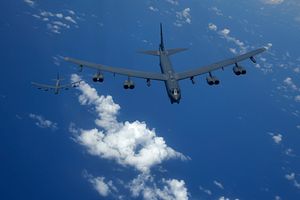International arms control is undergoing the most drastic changes since the end of the Cold War. The major pillars of the established arms control framework, such as the Anti-Ballistic Missile, the Intermediate Nuclear Forces, the Open Skies, and the New Strategic Arms Reduction (START) treaties, are either dead or dying.
The United States, one of the two most powerful nuclear superpowers, holds that its nuclear capability is not powerful enough, and has decided to spend more than all other nuclear weapon states combined to upgrade its nuclear triad, enhance forward deployed nuclear weapons in the western Pacific, improve its strategic defense system, and further integrate its nuclear and non-nuclear offensive capabilities.
Against this background, China has every reason to worry about the credibility of its nuclear deterrence capabilities.
The survivability of China’s nuclear arsenal is actually under ever greater threat. Space-based surveillance and tracking equipment helps the United States to accurately identify the specific locations of China’s nuclear arsenal, which could tempt the U.S. to launch a first strike against China.
In addition, the penetrating capability of China’s nuclear weapons could be compromised by the U.S. missile defense system. As China adheres to a No First Use policy, most of its nuclear arsenal might be destroyed by the first strike. In that case, even a relatively modest missile defense system will pose a great challenge to China’s remaining nuclear retaliation capabilities.
China holds that it is unwise to accumulate numerous nuclear warheads and then spend a lot to dismantle them as the United States and the Soviet Union did during and after the Cold War. But as a government responsible for the security of its own people, China cannot sit idly while the effectiveness and credibility of its nuclear deterrence is compromised. It will be a grave challenge for China if the United States again uses nuclear weapons to bully China, as it did during the Korean War and the Taiwan Straits crises in the 1950s.
Washington and Beijing need to add “four nos” as guardrails to prevent potential nuclear escalation. First, the United States and China should make every effort to avoid armed conflict. The golden rule of international order is to respect each other’s sovereignty and territorial integrity. By following that golden rule, the U.S. and China might effectively reduce the risks of armed conflict.
Second, there should be agreement on No First Use (NFU) of nuclear weapons. Some argue that a NFU policy is not credible. But if that is the case, it is hard to explain why both the Obama and Biden administrations tried but failed to adopt a NFU or sole purpose policy. Every person of integrity should acknowledge that NFU is relevant and meaningful. It will be a very useful step forward if the U.N. Security Council “P5” can sign a legally binding NFU Treaty.
Third, there should be no cross-domain deterrence. U.S. National Security Advisor Jake Sullivan said that guardrails should be added to manage the interplay between non-nuclear capabilities and nuclear deterrence. I fully agree with him on this point. But the 2022 Nuclear Posture Review inherits the Trump administration’s cross-domain deterrence policy by stating that nuclear weapons will not be only used to deter nuclear strikes, but also used to deter non-nuclear strategic strikes. That policy significantly lowers the nuclear threshold and drastically increases the risks of nuclear escalation. The United States, China, and the other P5 states should reach agreement on prohibition of that kind of cross-domain deterrence.
Fourth, there should be no unlimited development of missile defense systems. It is undeniable that missile defense has negative impacts upon strategic stability. The bilateral quarrel over missile defense is one of the root causes of U.S.-Russia tensions in the past two decades. An agreement should be reached to limit the development and deployment of missile defense systems in order to assure other nuclear weapon states that their nuclear retaliation capabilities will not be compromised.
In a series of articles, Chinese and American experts intend to make explicit the misperceptions that drive the mistrust in the ever-increasing instability in the bilateral relationship. Find the whole series here.

































